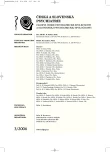Family Correlates of Depression
Rodinné koreláty depresivity v adolescenci
Autoři referují o výsledcích dotazníkového šetření mezi 3172 studenty náhodně vybraných středních a učňovských škol v České republice (respondence 94,7, průměrný věk 15,9 roku). 21 % sledovaných adolescentů uvedlo, že v posledním týdnu pociťovali výraznější depresivní příznaky. Počet depresivních děvčat 2,6krát převyšoval počet depresivních chlapců. 45,3 % dospívajících uvedlo, že někdy v životě mělo myšlenky na sebevraždu, pokus o sebevraždu uvedlo 8,8 % děvčat a 4,4 % chlapců.
Jako jednoznačně nejvýraznější stresový rodinný faktor byly respondenty vnímány konflikty a napětí v rodině, ve které adolescenti vyrůstali. Depresivní dívky a chlapci uváděli, že v jejich rodinách to není v pořádku a že tam nepanuje ovzduší důvěry a pochopení. S přibývajícími depresivními příznaky se zejména u dívek snižovala rodinná koheze. U chlapců nebyl zjištěn statisticky významný vztah mezi úplností rodiny a výskytem depresivních příznaků. Děvčata, která vyrůstala bez sourozenců, uváděla více depresivních příznaků. Nebyl zjištěn významný vztah mezi výskytem depresivních příznaků a přítomností (nepřítomností) prarodičů v rodině, ani mezi depresí adolescentů a vzděláním rodičů. Studie potvrdila vztah mezi hodnocením materiální situace rodiny a výskytem depresivních příznaků.
Výsledky studie naznačují, že život v neúplné rodině nemusí být vždy stresujícím faktorem a že vulnerabilita vůči depresi se výrazněji zvyšuje především v závislosti na bezprostředních problémech v základní rodině dospívajícího a atmosféře, která v ní panuje. Studie potvrdila významné gender rozdíly jak ve vnímání a hodnocení vlastních prožitků, tak rodinného kontextu. Děvčata jinak a citlivěji než chlapci reagovala na enviromentální podněty a sociální kontext.
Klíčová slova:
depresivní příznaky, adolescence, rodina, gender.
Authors:
F. D. Krch 1,2; L. Csémy 2
Authors‘ workplace:
Psychiatrická klinika 1. LF UK a VFN, Praha
; přednosta prof. MUDr. J. Raboch, DrSc.
Psychiatrické centrum Praha
1; přednosta prof. MUDr. C. Höschl, DrSc.
2
Published in:
Čes. a slov. Psychiat., 102, 2006, No. 3, pp. 130-136.
Category:
Original Article
Overview
The authors refer to the results of a questionnaire screening among 3,172 students of randomly chosen secondary and vocational schools in the Czech Republic (response rate 94.7; average age 15.9 years). 21 per cent of the adolescents questioned stated that in the past week they had rather significant symptoms of depression. The number of depressive girls was 2.6 times higher than the number of depressive boys. 45.3 per cent of the adolescents stated that they contemplated suicide sometime during their lives. 8.8 per cent of girls and 4.4 per cent of boys stated attempted suicide.
The respondents perceived conflicts and tension in the family in which they were growing up, as the single most significant stressing family factor. The depressive girls and boys stated that their families were not in order and that there was no atmosphere of trust and understanding. With increasing symptoms of depression especially in the girls, there was a decrease in family cohesion. In the boys no statistically important correlation between a complete family and occurrence of depressive symptoms was found. Girls growing up without siblings stated more depressive symptoms. No significant relation between the occurrence of depressive symptoms and the presence (or absence) of grandparents in the family was found, or between the depression of adolescents and the level of education of their parents. The study confirmed relation between assessment of the material status of the family and the occurrence of depressive symptoms.
The results of the study suggest that life in an incomplete family does not always have to be a stressing factor and that vulnerability towards depression is significantly increasing especially in relation to immediate problems in the basic family of the adolescent and to the atmosphere in the family. The study confirmed significant gender differences both in perception and assessment of one’s own experiences and the family context. The girls were responding in a different and more sensitive way to environmental stimuli and to social context.
Key words:
depressive symptoms, adolescence, family, gender
Labels
Addictology Paediatric psychiatry PsychiatryArticle was published in
Czech and Slovak Psychiatry

2006 Issue 3
- Memantine in Dementia Therapy – Current Findings and Possible Future Applications
- Memantine Eases Daily Life for Patients and Caregivers
- Hope Awakens with Early Diagnosis of Parkinson's Disease Based on Skin Odor
- Deep stimulation of the globus pallidus improved clinical symptoms in a patient with refractory parkinsonism and genetic mutation
Most read in this issue
- Sexual Orientation and Homosexual Experiences in Female Schizophrenic Patients
- Hypodynamic Syndrome in Abstinent Alcoholics
- Family Correlates of Depression
- Clinical Aspects of Suicidality
